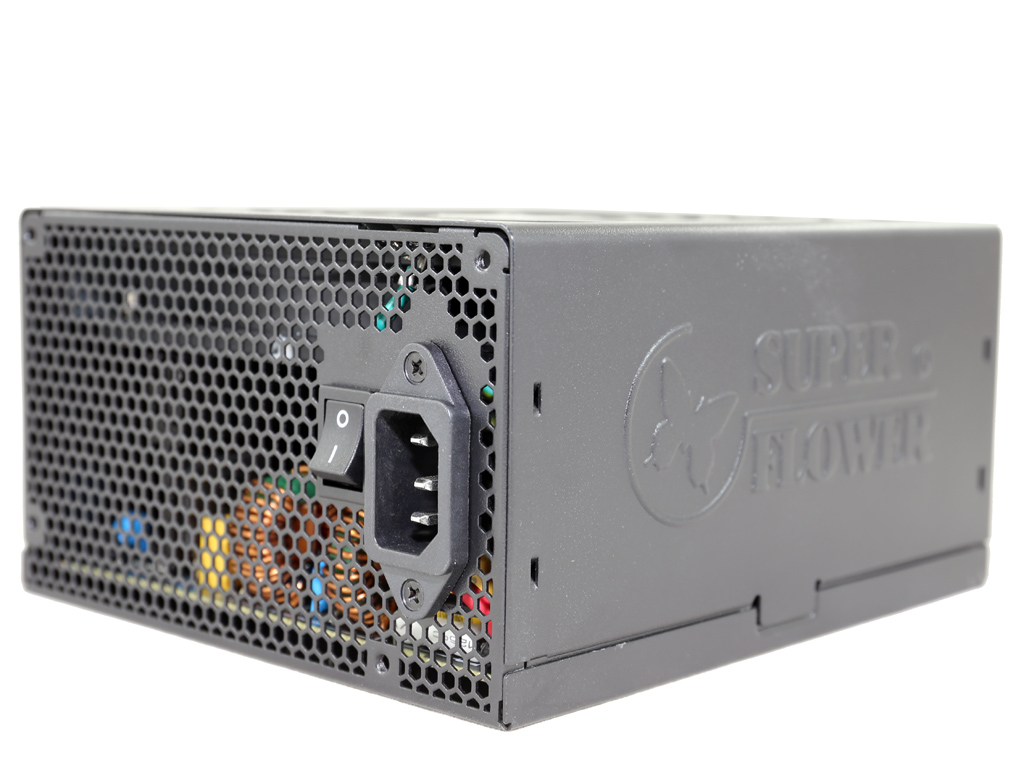Super Flower Leadex Gold 550W PSU Review
Super Flower has made quite an impact on the PSU market. Its Leadex platform enjoys huge popularity, both under SF's brand name and other companies like EVGA. The newest Leadex Gold-rated PSU with 550W capacity is on our test bench today.
Why you can trust Tom's Hardware
Pros, Cons And Final Verdict
The SF-550F14MG is a high-performance PSU with very tight load regulation on all of its major rails, excellent ripple suppression and quiet operation under normal operating conditions. As far as efficiency goes, Super Flower would need to improve if it wanted a first-place finish. But even with its current tuning it offers adequate efficiency. In addition, the modular cabling design proves to be very helpful during the installation and cable management process. And the LED-lit modular connectors look nice, though you need a windowed chassis to properly appreciate them.
The major downside of this unit is its low hold-up time, which not only fails to meet the ATX specification's requirements, but is also lower than the power-good signal's hold-up time—normally it should be the other way around. We could tolerate a low hold-up time if the power-good signal dropped before the rails went out of spec, but in no case can we tolerate a PSU that reports a power-good signal while its rails are out of spec. We don't know why Super Flower chose to do this, but it surely is a big flaw in this unit and we expect the company to fix it in the next revision of this platform.
It's a shame that such an otherwise-solid PSU is so flawed. This is the main reason we won't be giving an award to the SF-550F14MG.
The SF-550F14MG isn't available in the U.S. anyway. Here, you can get EVGA's 550 G2 instead, which offers similar performance. Notable differences between the two include a slightly smaller fan and illuminated/cube-shaped modular connectors on the SF-550F14MG. EVGA uses only Japanese capacitors, while Super Flower employs some CapXon caps on its modular PCB.
This is the first time we've seen a high-end Leadex PSU without all-Japanese caps, and to be frank, we didn't expect it. More than likely, Super Flower didn't have enough Japanese caps on hand (since they're difficult to obtain), so the use of CapXon caps was forced. Nonetheless, the company should have used Teapo caps instead, which are considered a safer and higher-quality choice. At least the CapXon caps are used in a low-stress area, and the hard part of ripple filtering is handled by Chemi-Con (Japanese) capacitors. We know that many users will be let down once they learn that this Leadex unit doesn't exclusively use Japanese caps.
To conclude, if you want only high-quality caps in your PSU and you also want to avoid the SF-550F14MG's problem with its power-good signal, then stick with EVGA's 550 G2, which uses only Japanese caps and, although it has a lower than 16ms hold-up time, its power-good signal is inline with the actual hold-up time.
MORE: Best Power Supplies
MORE: Power Supplies 101
MORE: How We Test Power Supplies
MORE: All Power Supply Content
Get Tom's Hardware's best news and in-depth reviews, straight to your inbox.
Aris Mpitziopoulos is a Contributing Editor for Tom's Hardware, covering Power Supplies.
Follow us on Twitter @tomshardware, on Facebook and on Google+.
Current page: Pros, Cons And Final Verdict
Prev Page Performance, Performance Per Dollar, Noise and Efficiency Ratings
Aris Mpitziopoulos is a contributing editor at Tom's Hardware, covering PSUs.
-
blazorthon Granted the EPS and PCIe wires don't see very high current in most situations (especially the EPS with Haswell or Skylake CPUs), I hardly ever see other PSUs using thinner gauge wires, so I can't imagine it saving enough money to be worth going thinner than the recommended 18 gauge wires most other PSUs have regardless of capacity.Reply -
Quaddro Why crapxon?Reply
I'm tired to see bulged crapxon..
If this one use jap caps, it'll be absolutely perfect.. -
mctylr ReplyUnfortunately, the bridge rectifier's markings are on its hidden side, and we try to avoid desoldering these type of parts since they are extra sensitive to increased heat
Huh? Since when are bridge rectifiers particularly heat sensitive? I would say that bridge rectifiers are not worth the hassle to desolder, unless you suspect it was an underrated part.
APFC controller is an NCP1653A provided by ON Semiconductor. It's installed on a small vertical PCB and is covered by insulation tape in order to decrease EMI noise.
That looks like paper and vinyl / PVC electrical tape wrapped around the vertical PCB, which provides electrical isolation only, I doubt it would make measurable difference in EMI. -
Aris_Mp According to my experience so far they are, unfortunately.Reply
This provides some EMI protection. There is no need for electrical insulation on this board. As for the degree or EMI protection I can examine this with my EMC probes (once I find the time to do it). -
Andi lim this review said uses a half-bridge topology, I only see one main capacitor. half bridge usualy uses 2 main cap and 2 main switcher right ?Reply -
Aris_Mp the number of APFC caps has nothing to do with the primary topology. However yes half-bridge uses 2 switchers.Reply -
Andi lim You are right, this is half bridge with LLC series resonant converter, nothing wrong with the primary capacitor.Reply
